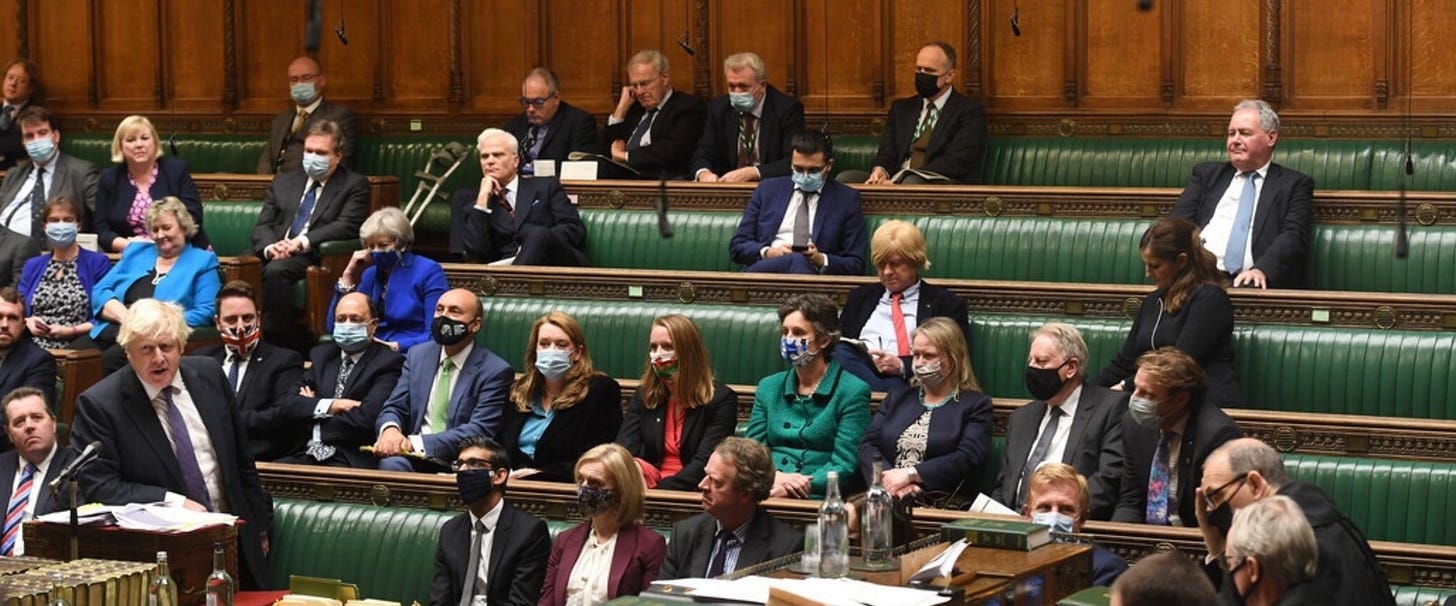Five signs Boris Johnson's leadership of the Conservative Party could now be in danger
The Prime Minister's internal opponents are starting to get restless.
Boris Johnson’s leadership of the Conservative Party really shouldn’t be in question given that it is less than two years since he won a huge general election majority.
And yet after a brutal few weeks in Parliament, his grip on his party is looking weaker than ever before.
Johnson’s botched attempt to save Owen Paterson from suspension and his retreat against Labour Party calls for restrictions on second jobs for MPs, have deeply angered his own party.
Here are five signs that suggest Johnson could be in much more trouble than we realise.
His own supporters are deserting him
Prime Minister’s Questions is normally an opportunity for ambitious Conservative backbenchers to ask planted questions about how brilliantly the government and its prime minister is doing.
Not only were such questions in short supply on Wednesday, but so were the MPs available to ask them.
In fifteen years of following PMQs I have never seen such sparse government benches than during Wednesday’s session.
And most of those who did attend looked deeply unhappy.
Potential successors are testing the water
The chaos of recent weeks has led to some of Johnson’s internal opponents to start organising against him.
Recent reports suggest the efforts are being led by former ministers including Gavin Williamson, who was sacked by Johnson earlier this year.
Already this is leading to the beginnings of what could eventually become fully-fledged leadership campaigns, with some likely candidates already doing the rounds among MPs as the Guardian’s Aubrey Allegretti has reported.
Briefings against Johnson are getting worse
Johnson on Wednesday evening met with Conservative MPs and admitted his handling of the Owen Paterson debacle had been like “crashing a car into a ditch.”
Before leaving the meeting, MPs were warned not to talk to journalists, like myself, who were stood outside.
However, it didn’t take long before one particularly brutal assessment of Johnson’s performance made it way to the BBC’s political editor Laura Kuennsberg.
This in turn led to a (later deleted) tweet from the Culture Secretary Nadine Dorries in which she appeared to criticise Kuennsberg for daring to repeat what she had heard from a Conservative MP.
Dorries, on Thursday, was later forced to row back from her tweet, telling the House of Commons that she “was not rebuking Laura Kuennsberg and never would,” while insisting that the BBC’s political editor was “the best in the business.”
None of this is a good sign of Johnson’s authority over his party.
Conservative MPs openly speaking out against the prime minister
The most telling moment from PMQs on Wednesday came when Conservative MP Jake Berry, formally a loyal supporter of Johnson, stood up to attack Johnson’s U-turn on his broken transport promises to Northern constituencies.
When Johnson’s decision to scrap his promise to build a high speed rail route between Leeds and Manchester was confirmed on Thursday, it led to an instant fury from a number of Conservative MPs from Northern constituencies.
As Huw Merriman put it to the Transport Secretary Grant Shapps: "this is the danger in selling perpetual sunlight and leaving it for others to explain the arrival of moonlight."
Giving into demands for apologies
Throughout his career Johnson has been almost entirely resistant to demands that he should apologise for wrongdoing, in the apparent belief that such apologies are a sign of weakness.
This “never complain, never explain” attitude almost came to an end this week however.
After being repeatedly called on to apologise for his role in the Paterson debacle, Johnson belatedly admitted his actions had been a “mistake” and compared it to crashing his car into a ditch.
He also admitted on Wednesday that he had been wrong to take off his mask during a visit to Hexham hospital last week, despite his spokespeople previously repeatedly denying he had broken any rules on the trip.
As Daniel Finkelstein wrote in the Times this week, such apologies rarely help politicians, and often just make things worse for them.
The fact that Johnson feels he has to now start admitting his own mistakes, suggests that even he now realises the trouble he has got himself into.









